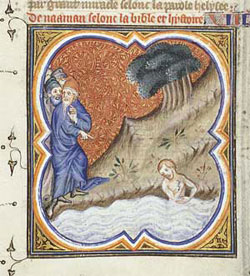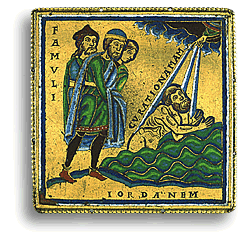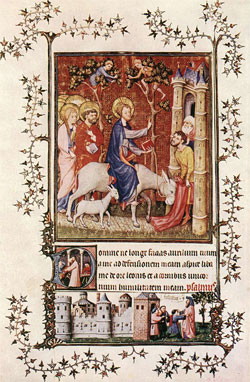For Sunday July 3, 2022
Lectionary Readings (Revised Common Lectionary, Year C)
2 Kings 5:1–14 or Isaiah 66:10–14
Psalm 30 or Psalm 66:1–9
Galatians 6:1–6, 7–16
Luke 10:1–11, 16–20
From Our Archives
For further essays on the lectionary for this week, see Sara Miles, Like Lambs Among Wolves (2007); Dan Clendenin, Believers Without Borders (2010); Go! Jesus Sends the Seventy-Two (2013); and Debie Thomas, Choosing What is Easy (2019).
The Harvard economist and Nobel laureate Amartya Sen is now eighty-eight, but he still remembers the day when he was eleven years old, when a laborer named Kader Mia stumbled into his family's yard in Dhaka, bleeding from knife wounds and begging for help. His father rushed Mia to the hospital, but he eventually died.
Kader Mia was a Muslim who was murdered by a Hindu thug. He was one of the thousands of Muslim and Hindu people who died in riots that erupted in British India in the 1940's. What interests Sen about his childhood memory is how even though most of those rioters shared an economic class identity as poor people, they nevertheless demonized each other with an "identity of violence." They reduced their shared humanity to the single factor of religious antagonism.
In his book Identity and Violence, Sen observes how much of the violence in the world today is fomented by an illusion in which we mischaracterize each other by a "sectarian singularity." We stereotype each other with any number of singular identities, like class, gender, race, or religion. These stereotypes then lead to fatalism, resignation, and a sense that conflict is inevitable. We partition people and even whole civilizations into binary oppositions, ignore the many and diverse ways that people understand themselves, and so obscure what Sen calls our "diverse diversities."
This separation of people into those who are included or excluded, insiders or outsiders, friends versus enemies, has expressed itself in Christianity and Judaism as "the scandal of particularity." Israel alone is God's elect people: "You only have I known of all the families of the earth" (Amos 3:2). Israel is not only God's special insider community; it is the only insider community. All other nations are outsiders—in Paul's language, Gentiles were "excluded from the commonwealth of Israel, and strangers to the covenants of promise" (Ephesians 2:12).
 |
|
Naaman washes in the Jordan River,
by Andreas Heidrich. |
Some early Christians eventually saw themselves as the successor "Israel of God" (Galatians 6:16) that displaced the unbelieving Jews, and who alone were the newly and truly chosen people of God. This "supersessionism," as it is sometimes called, developed its own long and unfortunate history.
One of the earliest expressions of this exclusivism comes from Cyprian (200–258), who wrote that "outside the church there is no salvation," and that “you cannot have God for your Father unless you have the Church for your Mother.” A thousand years later, Pope Boniface VIII wrote in his bull Unum Sanctum (1302), "We declare, say, define, and pronounce that it is absolutely necessary for the salvation of every human creature to be subject to the Roman Pontiff." The Eastern Orthodox churches insist that they alone are "the one true church of Christ on earth." Protestants are infamous for their radical individualism and sectarian splintering into new denominations, each one believing that it parses the truth better than anyone else.
Thankfully, when we read the Biblical stories more carefully, we discover important shades of gray in this black and white narrative. When God elected one particular community, Israel, his intentions were universal in scope from the very beginning, that in Abraham "all peoples on earth will be blessed" (Genesis 12:3). Those early Christians who proclaimed Jesus as the only way to the Father also imagined heaven populated with "a great multitude that no one could count, from every nation, tribe, people and language" (Revelation 7:9). Jesus wasn't just the "Son of Abraham" and "King of the Jews" (Matthew 1:1, 2:2); he was also the "Son of Adam" who represented all humanity (Luke 3:38).
The election of the Jews did not mean the exclusion of the Gentiles. Throughout the gospels, the Jewish Jesus embraced the unclean Gentiles—the Roman centurion, the Canaanite woman and her daughter, the woman at the well, and the "good" (!) Samaritan. In the healing of the ten lepers, only the outsider Samaritan gave thanks to Jesus—and even Jesus didn't refrain from calling him "this foreigner."
In his book The Faith of the Outsider; Exclusion and Inclusion in the Biblical Story, Frank Spina notes how this inclusion of the outsider is "neither incidental nor haphazard in the biblical witness." These stories often cast the insider in a negative light and the outsider as superior in virtue or faith. His book considers seven of these stories—Esau, Tamar, Rahab, Jonah, Ruth, the woman at the well, and then the lectionary passage for this week about Naaman in 2 Kings 5.
 |
|
Naaman washes in the Jordan River,
12th century Germany. |
Naaman epitomizes the outsider. He was from pagan Aram (= Syria), and a military officer of a major enemy of Israel. The narrator praises Naaman in glowing terms: "He was a valiant soldier, a great man in the sight of his master and highly regarded." Then he ads a shocking detail: "through Naaman the Lord had given victory to Aram."
God gave victory to Israel's enemy through a pagan officer? Yes. Finally, Naaman had a skin disease. This disease, as Spina notes, obviously caused Naaman some medical problems, but his real complications were social, religious, and moral, for people with such "impurities" were stigmatized as ritually unclean and therefore excluded from God's community.
In search of healing, this "highly regarded great man" (2 Kings 5:1) embarked on a state visit with opulent gifts to visit the king of Israel, a letter of commendation in hand. Instead of the king, though, he met an unnamed "little girl" (5:2) from Israel who had been captured by Aram's army and made a slave. She advised him to seek healing from the Hebrew prophet Elisha.
The irony is unmistakable and Naaman's response is predictable. When this nameless nobody instructed the famous military officer not to seek help from the corridors of political power, but from a fringe religious prophet who told him to wash himself seven times in the Jordan River, he was incensed.
But Naaman obeyed, he was healed, and then the plot thickens once more when he also converted: "Now I know that there is no God in all the world except in Israel." He then made a curious request to take dirt from Israel back to Aram, "for I will never again make burnt offerings and sacrifices to any other God but the Lord." Perhaps Naaman wanted to establish a portable "sacred space" back home? Although back home in Aram he continued to assist his master to worship in the temple of the deity Rimmon, Naaman asked for advance forgiveness for that compromise, and declared his fidelity to Israel's Yahweh.
 |
|
The Cleansing of Naaman by the Prophet
Elisha, Master of the Baptist, c. 1409. |
The story ends with a final reversal when Elisha's servant Gehazi connived to obtain the gifts that Naaman had offered to Elisha but which the prophet had refused. Gehazi, the religious insider of Israel's prophet Elisha, was then struck with the skin disease that originally afflicted the outsider pagan military commander Naaman. "The story that began with this disease ends with it," writes Spina, "with the difference that its victims have been reversed: the Aramean outsider has become clean, and the Israelite insider has become unclean."
In Identity and Violence, Sen suggests three ways that we can move beyond the illusion that we are destined to "identity violence." First, he appeals to our common humanity; everyone laughs at weddings, cries at funerals, and worries about their children. More important than any of our external differences, even though these are powerful and important, is our shared humanity. And so we commit ourselves to honor and protect the inherent dignity of every human being.
Second, he notes that individual people have plural identities. To fully understand and appreciate a person, one must consider factors of civilization, religion, nationality, class, community, culture, gender, profession, language, politics, morals, family of origin, skin color, and a multitude of other markers. Plus, these diverse differences within a single individual depend on one's social context, whether the trait is durable over time, relevant, a factor of constraint or free choice, and so on. It's misleading to caricature a person by reducing them to a single characteristic.
Finally, Sen urges us to transcend the illusion of destiny and identity violence by what he calls "reasoned choice." Instead of living as if some irrational fate destines us to confrontation with others who are different, we need to make a rational choice about what relative importance to attach to any single trait. In the end, he says, "we can do better."
NOTE: My essay title comes from the book by Miroslav Wolf, Exclusion and Embrace: A Theological Exploration of Identity, Otherness, and Reconciliation (Nashville: Abingdon,1996).
Weekly Prayer
Chaim Stern
Prayer for Overcoming Indifference
For the sin of silence,
For the sin of indifference,
For the secret complicity of the neutral,
For the closing of borders,
For the washing of hands,
For the crime of indifference,
For the sin of silence,
For the closing of borders.
For all that was done,
For all that was not done,
Let there be no forgetfulness before the Throne of
Glory;
Let there be remembrance within the human heart;
And let there at last be forgiveness
When your children, O God,
Are free and at peace.From Chaim Stern, editor, Gates of Repentance (Central Conference of American Rabbis, 1978).
Dan Clendenin: dan@journeywithjesus.net
Image credits: (1) MediaNet2002.de; (2) The British Museum; and (3) The Web Gallery of Art.





